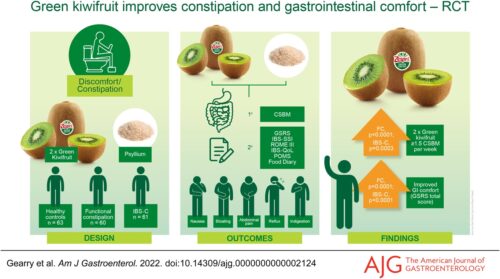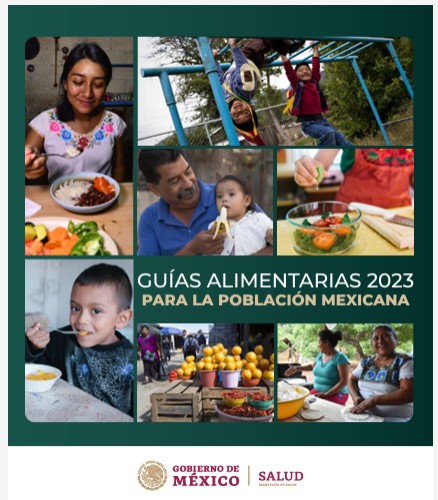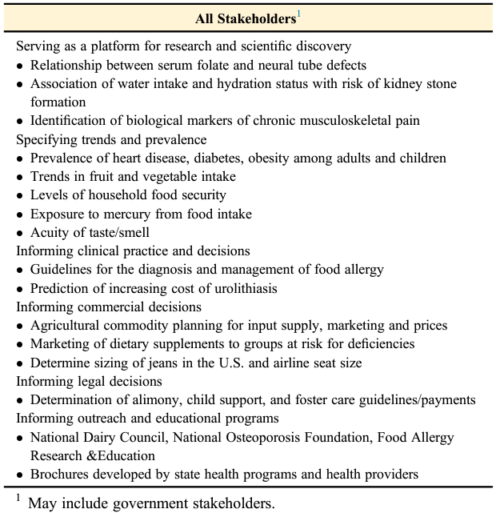Thanks to Bradley Flansbaum for sending this one from a journal not on my usual reading list: “In persons with constipation or IBS-C, kiwifruit vs. psyllium increased spontaneous bowel movements.”
I like the way this press release gets right to the point.
An industry-funded randomized trial assessed the effect of daily consumption of kiwifruit versus psyllium on GI function and comfort in 184 adults who were healthy, had functional constipation (FC), or met Rome III diagnostic criteria for constipation-predominant irritable bowel syndrome (IBS-C).
The study: Consumption of 2 Green Kiwifruits Daily Improves Constipation and Abdominal Comfort—Results of an International Multicenter Randomized Controlled Trial. The American Journal of Gastroenterology ():10.14309/ajg.0000000000002124, January 9, 2023. | DOI: 10.14309/ajg.0000000000002124.
Authors: Gearry, Richard MD, PhD; Fukudo, Shin MD, PhD; Barbara, Giovanni MD; Kuhn-Sherlock, Barbara PhD; Ansell, Juliet PhD; Blatchford, Paul PhD; Eady, Sarah MSc; Wallace, Alison PhD; Butts, Christine PhD; Cremon, Cesare MD; Barbaro, Maria Raffaella PhD; Pagano, Isabella MD; Okawa, Yohei PhD; Muratubaki, Tomohiko PhD; Okamoto, Tomoko PhD; Fuda, Mikiko MS; Endo, Yuka MD; Kano, Michiko MD, PhD; Kanazawa, Motoyori MD, PhD; Nakaya, Naoki PhD; Nakaya, Kumi PhD; Drummond, Lynley BTech (Hons)
Summary of the study

Methods: Participants included healthy controls (n = 63), patients with functional constipation (FC, n = 60), and patients with constipation-predominant irritable bowel syndrome (IBS-C, n = 61) randomly assigned to consume 2 green kiwifruits or psyllium (7.5 g) per day for 4 weeks, followed by a 4-week washout, and then the other treatment for 4 weeks. The primary outcome was the number of complete spontaneous bowel movements (CSBM) per week.
Results: Consumption of green kiwifruit was associated with a clinically relevant increase of ≥ 1.5 CSBM per week (FC; 1.53, P < 0.0001, IBS-C; 1.73, P = 0.0003) and significantly improved measures of GI comfort (GI symptom rating scale total score) in constipated participants (FC, P < 0.0001; IBS-C, P < 0.0001).
Conclusion: This study provides original evidence that the consumption of a fresh whole fruit has demonstrated clinically relevant increases in CSBM and improved measures of GI comfort in constipated populations. Green kiwifruits are a suitable dietary treatment for relief of constipation and associated GI comfort.
Financial support: Zespri International Ltd. was the principal sponsor and reviewed, approved, and funded the study design. The New Zealand study center trial was jointly funded by a grant from the New Zealand government (Contract C11X1312) and the sponsor company, Zespri International Ltd. In Italy and Japan, Zespri International Ltd. was the sole funder for each study center trial. The funder did not contribute to the study design or data analysis.
Potential competing interests: J.A. and P.B. are employed by Zespri International who part-funded the study. R.G. and L.D. sit on the Science Advisory Board, have received travel and research grants from Zespri International. SF and GB have received research travel grants from Zespri International.
Comment: Can you guess what Zespri International sells? Go on. Take a wild guess. I’ll admit it. I’d go for kiwi over psyllium every time. But we are talking here about an average improvement of 1.5 bowel movements a week, which may or may not be clinically meaningful.. I do give the authors credit for claiming a benefit for “fresh whole fruit,” not specifically kiwifruit. The study didn’t compare kiwi to other fruits (and why would it, given the kiwi fruit sponsor). But overall, this is yet another study done for marketing far more than scientific purposes.






